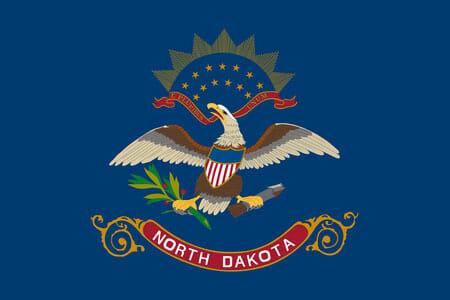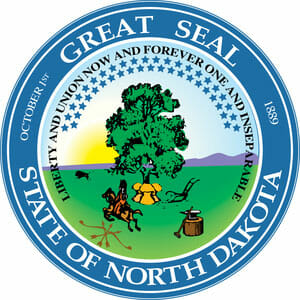There’s a lot of gambling going on in North Dakota for a state that has a blanket ban on most forms of betting. This is because, over the years, state lawmakers have poked holes in the prohibition by introducing several exception. And some of these laws are a little quirky.
Exceptions include charitable gambling, which was introduced in 1977 and has grown into a $2 billion industry. While there are no commercial casinos, tribal gambling and pari-mutuel betting became available in the 1990s, and multi-state lottery games were introduced in 2004.
North Dakota’s prohibition on gambling is rooted in Article XI of its constitution. Section 25 of this Article states that “the legislative assembly shall not authorize any game of chance, lottery, or gift enterprises, under any pretense, or for any purpose whatever”, leaving an exception for multi-state lottery games and charitable gambling.
The North Dakota Century Code defines gambling as “risking any money, credit, deposit, or other thing of value for gain, contingent, wholly or partially, upon lot, chance, the operation of gambling apparatus, or the happening or outcome of an event, including an election or sporting event, over which the person taking the risk has no control.”
This law doesn’t apply to contests of skill, and thus, popular DFS sites don’t have North Dakota on their lists of restricted states. Do note, however, that this clause doesn’t apply to ND internet poker.
Illegal gambling constitutes an infraction if the total amount of money wagered exceeds $25. Wagering more than $500 could result in a class A misdemeanor charge, which is punishable by up to one year in prison and a fine of up to $3,000.
Laws related to gambling can be found in the North Dakota Century Code 12.1-28-01 et seq. and 53.06.1-01 et seq.
| Allowed | Notes | |
| Land-based gambling | Yes | Nine tribal casinos, charitable gaming in bars |
| Online gambling | No | |
| Sports betting | Yes | Tribal, in-person only |
| Lottery | Yes | Multi-state only |
| Minimum gambling age | 18 (lottery, parimutuel) 19 (casinos) |
Online Gambling in North Dakota
North Dakota has never legalized online casinos or poker, and its laws broadly prohibit participating in unlicensed gambling, However, they don’t refer specifically to iGaming, so it’s tough to determine whether these rules extend to playing online or not. The state hasn’t ever tried prosecuting someone for playing at an offshore site, so it’s impossible to say unequivocally how the court would interpret such a case. Therefore, playing on an offshore site should be assumed to be a illegal, although the law is unenforced.
North Dakota Casinos
North Dakota businesses are prohibited from operating commercial casinos. However, thanks to the Indian Gaming Regulatory Act of 1988, the state negotiated several gaming compacts with local tribes in the 1990s.
As a result, they were able to build five full-scale casino resorts and several smaller gambling establishments across the state. A 2021 compact renegotiation allowed the tribes to offer retail sports betting.
The biggest casinos are The Dakota Magic Casino in Hankinson, the Sky Dancer Hotel & Casino in Belcourt, the Prairie Knights Casino and Resort in Fort Yates, the Spirit Lake Casino & Resort in Devil's Lake, and 4 Bears Casino & Lodge in New Town.
The compacts do impose some betting limits on the tribes' games. For example, a single wager on blackjack may not exceed $100, and for craps, it's capped at $60. The maximum single bet on a slot machine is $25.
The 22 compacts lowered the minimum gambling age at casinos from 21 to 19.
North Dakota Poker
Several of the big North Dakota casinos operate live poker rooms. However, state laws do skew the dynamics of the game. The tribes' compacts cap single poker bets at $50 with a three-raise maximum per round.
Lawmakers have made several attempts over the years to legalize online poker, but none have prevailed. As it stands, playing poker over the internet is assumed to be illegal, although the law is not enforced.
North Dakota Sports Betting
In December 2022, North Dakota Gov. Doug Burdum (R) and the state's five tribal nations signed new compacts that allowed the tribes to offer retail sports betting at their casinos.
In 2021 and 2023, a bill that would have put the question of whether to legalize statewide commercial sports betting, including online betting, to a public vote failed in the Senate.
That means sports books are confined to tribal reservations only – for now.
North Dakota Parimutuel Betting
North Dakota has two racetracks that offer live racing, Chippewa Downs and the North Dakota Horse Park. Parimutuel betting was legalized in 1990 and is regulated by the North Dakota Racing Commission.
Off-track betting is also available at a smattering of live venues, as well as online, via sites like TVG and TwinSpires.
North Dakota Charitable Gaming
Charitable gaming is a big deal in North Dakota. The industry is now worth nearly $2 billion, having grown 560% since 2018, according to the Gaming Division of the North Dakota Attorney General's Office. That's largely thanks to the introduction of electronic pull-tabs, slots-like machines that were legalized by the state legislature in 2017 in bars and at charitable organizations.
When the machines began springing up at liquor stores, gas stations, and convenience stores, lawmakers were required to rewrite the regulations to define what a "bar" actually was. The definition specifically excluded off-sale liquor stores, gas stations, grocery stores or convenience stores, but did include bars in hotels, bowling alleys, and restaurants.
The machines are regulated by the state attorney general's office. All game themes, sounds, and music also must be approved by the attorney general prior to being available for play.
Licensed non-profit organizations are also permitted to offer bingo, raffles, punchboards, sports pools, blackjack, poker, Calcutta pools, and paddlewheels at local bars and restaurants, although there are strict limits on stakes and prizes. The maximum bet on a charity blackjack table, for example, is $25, while the maximum prize in a single bingo game is $8,000.
Charitable gaming may only be conducted by a nonprofit corporation that has a gaming license issued by the Office of Attorney General or by an organization that has received a local permit from a city or county. All profits must go to good causes.
North Dakota Daily Fantasy Sports
North Dakota lawmakers haven’t tackled the issue of fantasy sports, and there appears to be little appetite in the legislature to do so. When asked about DFS contests in 2015, State Attorney General Wayne Stenehjem stated that “if it’s a game of chance, it’s not likely legal, and if it’s a game of skill, then it would likely be legal.”
Well, that's cleared that up! Since then, the Attorney General's Office has issued no official opinion on the matter.
Major DFS platforms, such as FanDuel and DraftKings, have no qualms about offering their services to North Dakota residents.
North Dakota Lottery
North Dakota established its lottery in 2004 after residents voted to change the state constitution to allow it to join the Multi-State Lottery Association (MUSL). This means North Dakotans can take part in the big multi-state draw games like Powerball and Mega Millions, although, curiously, intrastate games remain illegal. The full list includes Powerball, Lucky for Life, Mega Millions, Lotto America, and 2BY2.
Lottery tickets can be purchased in hundreds of retail shops located across the state. Online sales are not permitted, and unlike many other state lotteries, the NDL doesn’t sell any scratch cards and doesn’t host keno games.
North Dakota Gambling FAQ
Does North Dakota have casinos?
Yes, North Dakota is home to nine tribal casinos, including the Sky Dancer Hotel & Casino in Belcourt, the Prairie Knights Casino and Resort in Fort Yates, and the Spirit Lake Casino & Resort in Devil's Lake.
Can I play slots in North Dakota?
Yes, North Dakota's nine tribal casinos offer a good range of slots, although single bets may not exceed $25. The state also licenses and regulates slots-like electronic pull-tabs, which can be found in bars and restaurants across the state.
Can I gamble online in North Dakota?
North Dakota does not license or regulate online casino gaming or poker, although some residents choose to play on offshore sites. This is assumed to be illegal, although the law has never been enforced.
Does North Dakota have sports betting?
Yes, North Dakota's tribal casinos offer in-person retail sports betting. There is no legal online sports betting.
Is online poker legal in North Dakota?
No, online poker is not legal and regulated in North Dakota, although many offshore sites accept players from the state.
What are the weird betting limits in North Dakota casinos?
Tribal compacts impose caps on betting at tribal casinos. These include a cap of $100 per wager on blackjack and $60 on craps. Slots are capped at $25 per spin. Single poker bets are capped at $50 with a three-raise maximum per round.
Does North Dakota have racetracks?
Yes, North Dakota has two racetracks that offer live racing and parimutuel betting, Chippewa Downs and the North Dakota Horse Park.
Does North Dakota have a lottery?
Yes, although, oddly, the North Dakota lottery offers multi-state draw games only. No intrastate games are available.
North Dakota Constitution
Article XI
Section 25. The legislative assembly shall not authorize any game of chance, lottery, or gift enterprises, under any pretense, or for any purpose whatever. However, the legislative assembly shall authorize the State of North Dakota to join a multi-state lottery for the benefit of the State of North Dakota, and, the legislative assembly may authorize by law bona fide nonprofit veterans', charitable, educational, religious, or fraternal organizations, civic and service clubs, or such other public-spirited organizations as it may recognize, to conduct games of chance when the entire net proceeds of such games of chance are to be devoted to educational, charitable, patriotic, fraternal, religious, or other public-spirited uses.
See my article on the North Dakota Internet Poker Licensing Bill, which failed to be passed.
North Dakota Century Code
12.1-28-01. Gambling - Definitions. As used in this chapter:
1. "Gambling" means risking any money, credit, deposit, or other thing of value for gain, contingent, wholly or partially, upon lot, chance, the operation of gambling apparatus, or the happening or outcome of an event, including an election or sporting event, over which the person taking the risk has no control. Gambling does not include:
a. Lawful contests of skill, speed, strength, or endurance in which awards are made only to entrants or to the owners of entries; b. Lawful business transactions, or other acts or transactions now or hereafter expressly authorized by law; or c. Use of gaming equipment and devices that may not otherwise be lawful in the state when the equipment or devices are used by any institution under the control of the state board of higher education which awards degrees of bachelor's or higher for the purpose of conducting scientific research in a controlled environment on the campus of that institution.
2. "Gambling apparatus " means any device, machine, paraphernalia, or equipment that is used or usable in the playing phases of any gambling activity, whether that activity consists of gambling between persons, or gambling by a person involving the playing of a machine. Gambling apparatus does not include an amusement game or device as defined in section 53-04-01.
3. "Gambling house " means any location or structure, stationary or movable, wherein gambling is permitted or promoted, or where a lottery is conducted or managed. In the application of this definition, any place where gambling apparatus is found is presumed to be a gambling house, provided that this presumption shall not apply where cards, dice, or other games are found in a private residence.
4. "Lottery " means any plan for the distribution of a thing of value, whether tangible or intangible, to a person or persons selected by chance from among participants, some or all of whom have given a consideration for the chance of being selected.
12.1-28-02. Gambling - Related offenses - Classification of offenses. Except as permitted by law:
1. It is an infraction to engage in gambling on private premises where the total amount wagered by an individual player exceeds twenty-five dollars per individual hand, game, or event.
2. It is a class A misdemeanor to:
a. Sell, purchase, receive, or transfer a chance to participate in a lottery, whether the lottery is drawn in state or out of state, and whether the lottery is lawful in the other state or country;
b. Disseminate information about a lottery with intent to encourage participation in it, except that a legal lottery may be advertised in North Dakota; or
c. Engage in gambling on private premises where the total amount wagered by an individual player exceeds five hundred dollars per individual hand, game, or event.
3. A person is guilty of a class C felony if that person engages or participates in the business of gambling. Without limitation, a person is deemed to be engaged in the business of gambling if that person:
a. Conducts a wagering pool or lottery;
b. Receives wagers for or on behalf of another person;
c. Alone or with others, owns, controls, manages, or finances a gambling business;
d. Knowingly leases or otherwise permits a place to be regularly used to carry on a gambling business or maintain a gambling house;
e. Maintains for use on any place or premises occupied by that person a coin-operated gaming device; or
f. Is a public servant who shares in the proceeds of a gambling business whether by way of a bribe or otherwise.
4. a. As used in subsection 3 but with the exceptions provided by subdivision b of this subsection, the term "coin-operated gaming device " means any machine that is:
(1) A so-called "slot" machine that operates by means of the insertion of a coin, token, or similar object and which, by application of the element of chance, may deliver, or entitle the person playing or operating the machine to receive cash, premiums, merchandise, or tokens; or (2) A machine that is similar to machines described in paragraph 1 and is operated without the insertion of a coin, token, or similar object.
b. The term "coin-operated gaming device" does not include a bona fide vending or amusement machine in which gambling features are not incorporated as defined in section 53-04-01, or an antique "slot" machine twenty-five years old or older that is collected and possessed by a person as a hobby and is not maintained for the business of gambling.
c. A law enforcement officer may seize any device described in subdivision a upon probable cause to believe that the device was used or is intended to be used in violation of this chapter or chapter 53-06.1. The court shall order the device forfeited in the same manner and according to the same procedure as provided under chapter 29-31.1.
Click here for --> North Dakota Charitable Gaming





